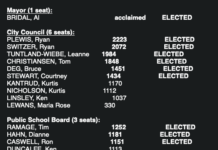
The ripple effect of a $6.5 million budget reduction for the Chinook School Division from 2017-2018 will continue to be felt during the coming years.
Chinook School Division Director of Education Kyle McIntyre said they have some additional belt tightening to make in the coming two years despite making a $6 million reduction in expenditures this past school year.
McIntyre was speaking at Monday’s Board-School Community Council Spring Forum, where he confirmed they have a two year plan to address their changed staffing formula which is occurring because of budgetary constraints.
“Right now we have 55 more teachers than what we’re funded for. But when we go to other areas of our budget, it turns out to be about 40. So we’ve have discussions with the ministry and we have amended our staffing formula. We will be implementing a new staffing formula. So probably over the next two years, we’re looking for – through natural attrition, retirement, resignations, managing vacancies – we’re forecasting about 28 teachers over the next two years that we’re going to be down,” McIntyre said.
And while they hope to achieve these staffing levels through attrition, they could be forced to make cuts to achieve their targets.
“Whatever we don’t make up in our first year, we’re going to have to make up in the second year. And that may be layoffs,” he conceded.
The changed staffing formula is one of the cuts in place as they pursue a Chinook Board of Education mandate to balance the budget by 2019-2020. They have already meet with ministry officials to share their plan which is being implemented over the next two years in an attempt to balance their budget.
“Our board certainly will set direction or develop a budget that they think will work for Chinook, but ultimately it’s the ministry and the government who approves and sets the budgets.”
McIntyre and other Chinook officials will be meeting with the Ministry of Education for a pre-budget discussion, where he intends to raise some concerns about the current funding level.
“We think we need a bit of a special provision here. One of the changes that was brought into effect last year with the educational finance review, was we lost something called dispersion funding. Dispersion funding was extra recognition for our division to continue to provide supports to the extreme and rural areas of our division.”
“Really it seems that some of the budget rules and practices that were brought into effect last spring really were not for a rural model like Chinook has.”
McIntyre pointed out that Chinook boasts over half of Saskatchewan’s Hutterian Colony School, and 76 per cent of Southwest schools boast under 100 students.
“School closure is not on the books for anyone politically, whether it’s a board or whether its the province,” he said. “So our argument is that, you know what we can not take diminishing resources and continue to stretch them amongst 62 schools.”
He is hoping some additional funding can be restored to help alleviate the impact of cuts they have already made. McIntyre noted that Chinook was one of the hardest hit divisions by some of the educational finance changes.
“I think we need a different type of recognition for our structure here in the Southwest. With the number of small rural schools we have, we need some kind of a special allowance or recognition in the funding formula.
“Would it help soften the blow in terms of some of the staffing challenges that we have? It could. But right now what we’re doing with our finite pool of resources, is we’re just stretching them further and further and further amongst our division.”
Monday’s Board-SCC Spring Forum was the first time a new format was utilized instead of their previous annual meetings. Recent legislative changes to the Education Act no longer require a School Division to hold an annual meeting.
“Our Board of Education though felt it was important to connect with our SCC’s so we had a little bit of a hybrid – we did some celebration of learning, but we also did some of the business that we might traditionally do at an annual meeting.”

McIntyre noted this new opportunity attracted an audience well above the traditional attendance at their annual meetings.
“So I think in terms of the crowd that we had tonight, the hybrid really was excellent. It certainly was an opportunity to acknowledge our SCC’s, but also as partners to let them know about some of the challenges that we have moving forward as an organization.”
He added the turnout was also reflective of the concern Chinook SCC’s have regarding education.
“Parents want what’s best for their children. We probably have an education community where we have more SCC’s engaged working directly with our board and with our principals and with our schools than any other division in the province,” McIntyre said. “Their work is aligned with our strategic plan. And certainly if something is going to happen to our division that’s going to impact kids and impact their schools adversely, I think they need to be on side and they need to know about it.”





